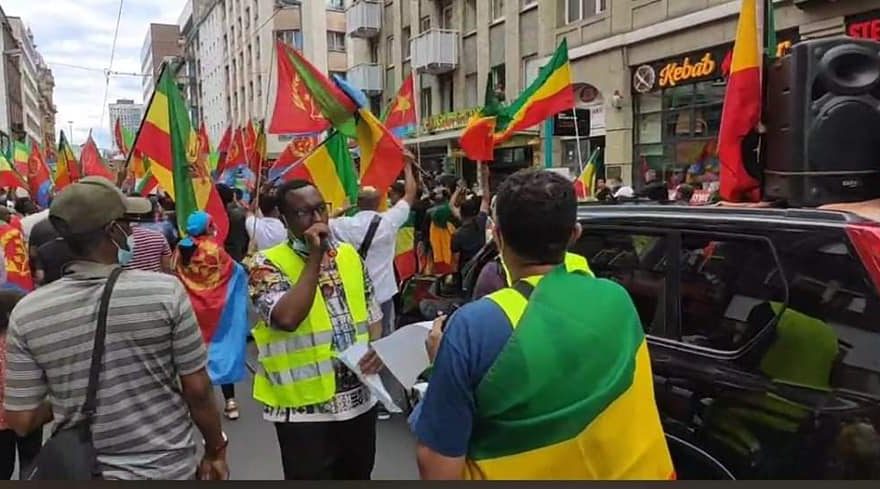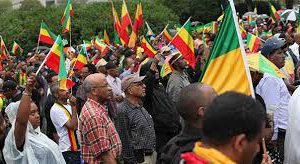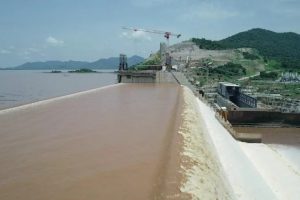
BY STAFF REPORTER
Ethiopians and Eritreans in Germany have demonstrated to the voice their concern for peace and stability in the Horn of Africa, according to the Ethiopian Diaspora Agency (EDA). The demonstrators have denounced the terrorist acts of the TPLF junta that is causing havoc in the region.
Their demonstration is the latest such development among series of events Ethiopians are staging in their respective countries of residence to contribute their share in promoting development and peace in their lands of origin.
In recent months Ethiopians in various European counties and the United States are making a lot of efforts in promoting the interests of their nation and preventing the activities by the TPLF clique abroad.
This also demonstrates the changing view to the role of diaspora in peace and stability at home. Some literature indicates that previously they were viewed as supporters of insurgencies and political opposition. As a result, many governments viewed them as opponents and they are kept aloof of involving in political and peace building initiatives at home.
But in some countries, there are changing trends in the involvement of diasporas by expanding the domain of their involvement from only sending financial remittances to contributing social remittances. According to a study by Adele Galipo Direct political involvement in their countries of origin and advocacy and lobbying within countries of residence can also be considered as social remittances. Thanks to their experience abroad, diasporas are willing to transfer new political practices and perspectives to their homelands. Even when they do not directly participate in the political process, diasporas can offer their expertise to peace negotiations as facilitators and mediators between the conflicting parties (Mohamoud 2005) and act as bridges between their home and host societies.
Normally refugees leave their homeland due to, among other things war and conflict. Lack of peace and stability is the main driver of refugees to places where they can get either temporary or permanent shelter. The refugees remain there until their homeland gets back safer.
However, those who settle in countries with better economic and political situation tend to remain there for relatively much longer period. Most of the time the diaspora tend to return home and engage in local political and economic activities especially when peace and stability at home is restored.
The question of who brings about peace and stability at home is an important and timely one. What comes to mind first is the responsibility of military and political forces that mainly engage in ensuring peace and stability in areas that are affected by the lack of it.
Studies indicate that the diaspora community also play a big role in building peace at home. Migrants show a strong commitment towards their countries of origin that translates into substantial transfers of financial, as well as social, cultural and human capital. In addition, diasporas are proven to organize themselves in their countries of residence in order to actively engage in community initiatives and development-oriented interventions.
Migrants are thus believed to bring valuable contributions towards homeland development in an increasing number of spheres. Among these, recent research has highlighted that diasporas can play a significant role also in processes of peace building and reconstruction in countries affected by conflict.
Diasporas can contribute in various ways to peacebuilding, responding to the need «to create
structures and mechanisms to ensure not only compliance with the terms of an [peace] agreement but a radical rebuilding of a more peaceful structure» that will prevent the conflict from recurring.
In the past, literature mostly highlighted the negative effects of diasporas’ influence on conflict settings. Authors variously described migrants as posing a risk of perpetration and transnationalisation of the conflict. Diasporas, in fact, may not only provide material and political support to the conflicting parties, but they may also carry attitudes of conflict with them and reproduce them within the diaspora.
More recent contributions, however, argue that diasporas can also contribute positively to peacebuilding processes by engaging in initiatives that either directly promote profitable dialogue processes or indirectly contribute to economic and social advancement, thus creating the grounds for sustainable peace.
The existing literature on the diasporas-conflict-peace-development nexus has shown both the conflict-exacerbating and the conflict-mitigating sides of diasporas’ involvement in their countries of origin. However, what has emerged from the current debate is that it is fundamental not to make generalizations about diasporas’ transnational involvement.
THE ETHIOPIAN HERALD AUGUST 3/2021




